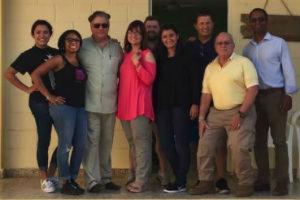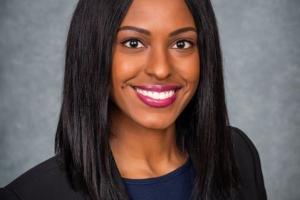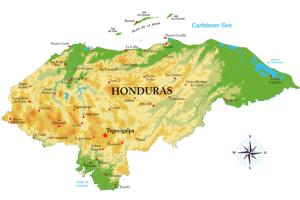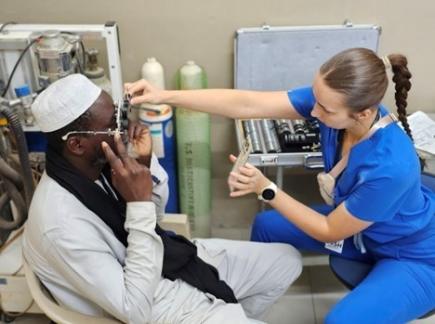
SUNY College of Optometry student Julianna Dolinski shares her first-hand, life-changing experience during a recent SVOSH trip to West Africa.
By Julianna Dolinski, O.D. candidate Class of 2025, SUNY College of Optometry
A few months ago, I registered for Part I of the NBEO exam on the first day possible. I had a plan: Take it Monday. Fly out for a vacation on Tuesday. My plan to not think about eyes for a few days after boards changed when SUNY’s Student Volunteer Optometric Services for Humanity (SVOSH) Club invited me on a mission trip to Senegal, Africa. The trip was set to depart just three days after my boards.
Going to Africa had always been a dream of mine, but this was not going to be the relaxing vacation I originally wanted. This was a VOSH mission to provide primary eye care at no-cost to communities with little to no access to eye care, the goal of all their missions. I called my mom, and within minutes, I emailed back to accept the invitation to my first mission trip after we both agreed that I couldn’t let this opportunity pass.
A Warm Welcome in Senegal
At JFK airport, I met the group, which consisted of seven fellow SUNY Class of 2025 buddies; two third-year students from SCCO; four volunteers; eight ODs; and one physician. Although we were in a foreign place, we were warmly welcomed by a woman named Mame. Mame spent six years planning with the VOSH team, and people she called “brothers and sisters.”
Mame had planned a special stop before taking us to where we were staying, her mom’s house. Through teary eyes, she explained how much her mother had sacrificed for her and her siblings. She built a home for them and made sure they were all educated. We all quickly agreed that Mame’s mother was going to be the very first patient we saw in our clinic.
VOSH and SVOSH Teams Get to Work
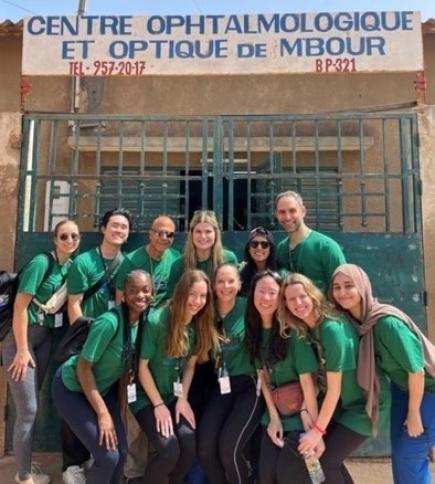
“Centre Ophtalmologique Et Optique de Mbour” was written on a plank of wood and labeled the building where we would work. It was a local ophthalmologist’s building, filled with old surgical machinery, cots, an old autorefractor, and one half-functional slit lamp (I say half-functional because you had to smack the lighthouse for the lamp to work, and even that method stopped working after day three).
After evaluating the space, we set up our primary care clinic. Intakes, VAs, IOP readings, and dilation drops took place in the outside yard under three large tents: autorefraction as patients entered the building; four refraction stations; one room for the physician to take blood pressure readings and check blood sugar levels; a disease room for fundus exams; and finally a dispensing station where we either gave patients glasses from donated stock or ordered their prescription glasses through a donor program.
We brought readers, sunglasses, bags of various eyedrops, some oral antibiotics, and our own diagnostic kits and trial lenses.
Helping Thousands of Patients in a Few Days
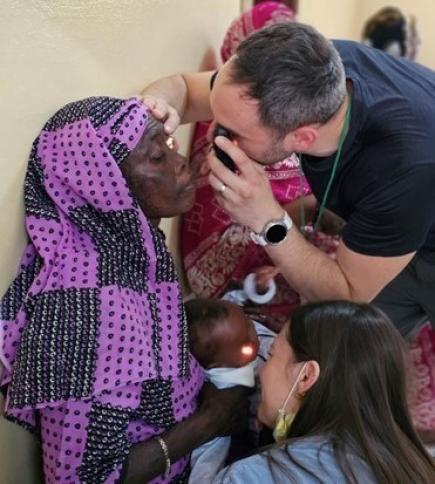
During each of the next 5 days of our 8 a.m. – 5 p.m. clinic, we rotated roles. We saw about 2,850 patients, dispensed over 2,500 glasses, and treated or referred over 1,000 patients with disease.
I saw more patients and more disease in these five days than I have seen in my entire three years of optometry school. There were moments of frustration. Times where I questioned how much we were helping.
Despite a language barrier, any optometrist can understand when a face brightens after refraction, or when a patient holds onto your hand to give you a sincere “thank you” without words.
Even better, when they hand you their baby and you examine their child in your lap while the baby plays with your lens paddle. People were so grateful to be seen, to be treated, to have answers, and to receive a pair of glasses or medication that can hold them over until they can see a local doctor that we recommended.
Life Lessons Learned
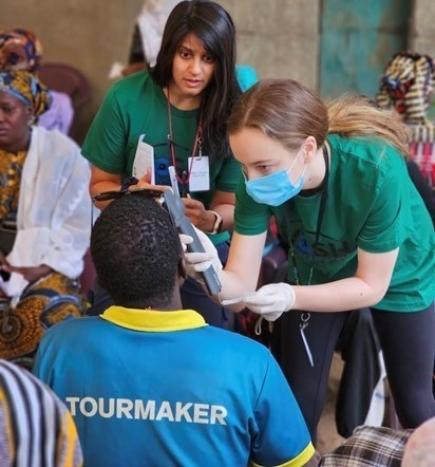
I was looking forward to this trip to explore a new part of the world, practice my skills, and help people. I did all those things.
What I didn’t expect was how much I would learn about myself, how much my perspective on life and career would change, and how close I would get to the team, now my brothers and sisters. I cherished every moment where the group volunteer effort helped this trip come to fruition and showed that the whole is truly greater than the sum of its parts.
There are many things I will never take for granted again, many things I am newly thankful for, and many things that I realize just simply do not matter compared to the problems other people face. The ability to help people in the way we did is something I will cherish for the rest of my career.
I was mesmerized by the bright Senegalese culture and trust within the community, enough that strangers would grab someone’s baby if the child fell from their mother’s back. No one even batted an eyelash. This was a reminder that, just like we were all in it together for this trip, so too are we in the lives we are lucky to live, as we figure out how to reach our goals and stay happy and healthy.
CooperVision's Continued Support
This volunteer trip would not have been possible without the support from many, including CooperVision. VOSH International and SVOSH-SUNY are grateful that CooperVision continues to recognize and support the provision of primary eye care to disenfranchised communities worldwide.
A Heartfelt Thanks to the Team
As I continue to reflect on this trip, there are many to thank who donated their time and effort and supported me through it and after it. Special thank you to our team: Mame Dabo and her brothers and sisters; Dr. John Spencer; Dr. Lisa Weber; Dr. Frank Villa; Dr. Gregory DiSanto; Dr. Nelly Kalu; Dr. Beena Patel; Dr. Matthew Bovenzi; Dr. Sarah Gleason; Dr. Pam Sutherland; Beth Westerback; Shawn Matsumoto; Christina Canellos; Nicole Loan; Lyndsey Campbell; Taylor Greaves; Clare Hwang; Salsabyl Mansour; Brynn Babey; Jacquilin Nguyen; Molly Weber; Wendy Unland’ Hannah Lingenfelter; SUNY SVOSH, And many, many others.
Find out more about CooperVision’s Student Programs here. And discover other resources and learnings at CooperVision’s Online Success Center.
Julianna Dolinski is an O.D. candidate, Class of 2025, and Student Optometric Association for Private Practice President, SUNY College of Optometry






